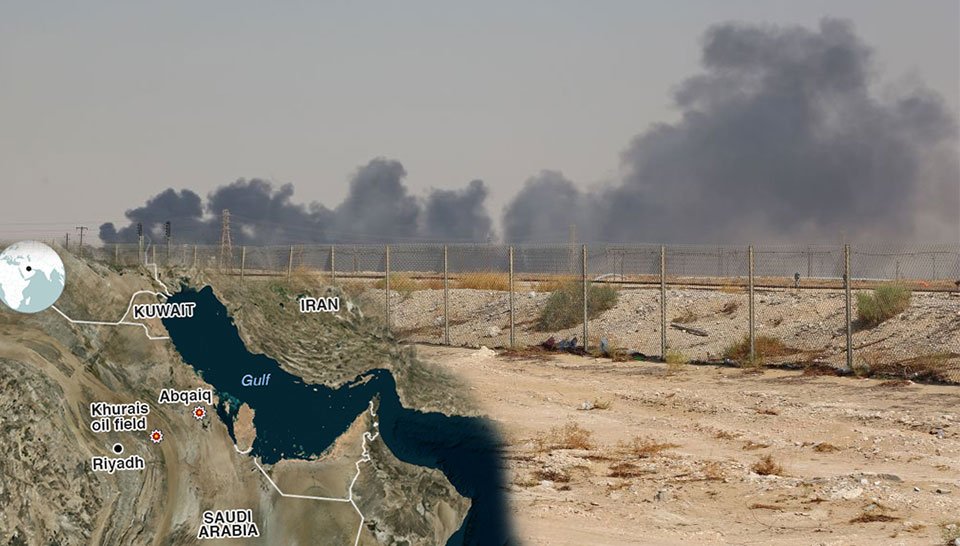Why has Iran attacked Saudi Arabian oil infrastructure when it risks sparking a conflict more damaging than the sanctions it faces and undermines the goodwill necessary for a future deal?
In response to unprecedented sanctions on its oil and gas sector, Iran is escalating attacks on oil and energy assets in the Persian Gulf using a brinkmanship strategy that aims to force the United States to shift its policies.
- Iranian actions include the retaliatory seizure of oil tankers following the interdiction of Iranian-flagged vessels, the harassment of maritime traffic in the Persian Gulf, the downing of a U.S. drone in June, a drone strike against two of Saudi Arabia’s East-West pipeline pumping stations in May, and an attack that caused a fire at that country’s Shaybah oil field’s processing complex in August.
- Iran is also accelerating the country’s nuclear activity following the suspension of the nuclear deal known as Joint Comprehensive Plan of Action (JCPOA), since it increases Iranian leverage for negotiations that Tehran knows are ultimately inevitable.
- Tehran is calculating that these actions will ultimately yield more favorable negotiating terms, facilitating the removal of sanctions, once Iran perceives that conditions are right for talks — even though the actions risk incurring U.S. or Saudi retaliation.

What does this mean for the United States’ strategy in its confrontation with Iran?
The United States remains committed to a sanctions-first strategy in dealing with Iran as Washington tries to force Tehran to abandon its ballistic missile and nuclear programs and its support for proxy forces across the Middle East.
- In a Sept. 18 tweet, U.S. President Donald Trump hinted at a “substantial” increase in sanctions on Iran within 48 hours, and the State Department has repeatedly reiterated that sanctions are the primary U.S. tool to try to alter Iranian behavior. On Sept. 20, the U.S. Treasury announced new sanctions on Iran’s central bank.
- Trump has displayed a clear reticence to striking Iran militarily in the run-up to the 2020 U.S. presidential election, preferring more muted actions such as cyberattacks and additional sanctions.
While less likely, the United States might assess that military retaliation is necessary to punish Iran and deter against future attacks. Washington is also considering joint operations with Saudi Arabia in which the Saudis would lead retaliatory actions against Iran aided by U.S. intelligence, targeting and surveillance.
- Working in a coalition with Saudi Arabia places the burden on regional U.S. partners to lead the strike, which is in line with the preferred U.S. strategy in which regional partners lead and the United States remains at arm’s length from the action.
- Potential reciprocal targets in response to the Abqaiq and Khurais strikes include targeted strikes on Iran’s oil and gas sector or on Islamic Revolutionary Guard Corps facilities, which could deter future Iranian strikes in addition to serving as punishment.
How is Saudi Arabia likely to respond?
Saudi Arabia hasn’t clearly signaled its preference regarding a unilateral response, coordinated action with the United States, or the adoption of a wait-and-see approach, but Stratfor judges that Riyadh is hesitant to strike Iran, which could initiate a major and direct military conflict with Iran.
- The attacks on Saudi oil facilities at Abqaiq and Khurais revealed the inability of Saudi air defenses to protect against attacks on its oil infrastructure; Saudi Arabia does not want to invite another attack by provoking Iran.
- Saudi Arabia has direct intelligence linking Iran to the attacks but doesn’t want to say that the attacks were launched from Iran, respond militarily or embroil itself in a larger conflict with the Islamic republic.
- Saudi Arabia could attempt to convince the United States to ease sanctions on Iran as a path toward de-escalation.
- Saudi Arabia could reach out to Iran on its own accord to try to negotiate something that limits future attacks as a part of regional dialogue.
Given these constraints, Riyadh probably prefers to attack Iran indirectly by hitting one of Tehran’s proxies in Yemen, Syria or even Iraq, but the severity of the attack on Abqaiq could embolden Riyadh if the kingdom perceives or receives clear assurances of U.S. support.
If not this, then what is the threshold for Saudi Arabia to respond militarily against Iran?
Riyadh has not publicly set red lines, but it may calculate that the loss of Saudi life in a direct Iranian attack is the only casus belli that will prompt it to act directly against Iran.
- If Iran engages in another successful attack of an equal scale, that could reach the threshold at which Saudi Arabia would respond, especially because that would compromise Saudi energy infrastructure redundancy.
- Saudi Arabia may also not assess the threat of a repeat attack by Iran to be high, or may assess that it can defend itself better in the future since it is now adjusting defense assets.
In what ways is Saudi Arabia still vulnerable to similar attacks?
Saudi air defenses are insufficient to cover its geography, leaving significant air defense gaps, especially around critical energy infrastructure.
- The Royal Saudi Air Defense Forces rely heavily on U.S.-made Patriot surface-to-air missile systems, which a sustained number of missile and drone attacks over a period of time can overwhelm. The Patriots are also configured to strike ballistic missiles, not cruise missiles and suicide drones — both of which were used in the Sept. 14 attacks.
- Saudi Arabia also has numerous critical oil and gas facilities that are vulnerable to future attacks, including the Jubail plant, the Juaymah facility, the Shaybah oil field, the Berri Gas Plant and the Safaniya processing plant; moreover, without much redundancy left at Abqaiq, a second strike there could have far more serious consequences.
- Midstream oil and gas facilities, airports and ports, and water desalination plants are also potential targets in the event of a military escalation with Iran.
- We don’t know if Iran is planning similar attacks in the near future. But if Iran thinks the U.S. and Saudi hesitance to respond militarily against Iran is high enough and the maximum pressure campaign continues unabated, Iran will likely consider more attacks.
What is the risk this situation presents for the other Arab Gulf states, as well as the broader region?
A broader conflict between Saudi Arabia and Iran could spread economic damage to parts of the Gulf more closely aligned to Riyadh, but other states that have carved out better relations with Tehran are less likely to feel the impacts from the escalating tensions.
- All countries bordering the Persian Gulf would suffer collateral damage in the form of temporary impacts to their energy, financial, tourism, shipping and logistics sectors in the event a conflict between Iran and Saudi Arabia.
- Kuwait, Qatar and Oman have all cultivated pragmatic relationships with Iran in a bid to reduce the damage to their economies if a broader regional conflict erupts.
- Saudi Arabia, Bahrain and the United Arab Emirates could face a direct attack from Iran due to their more complicated and adversarial relationships.
Globally and specifically, how is this going to affect energy markets in the region?
Energy experts view Abqaiq and Khurais as critical nodes in the global oil processing network, and near and longer-term market impacts are unlikely to be significant based on the current assessments that Saudi Aramco has publicly released. Still, the attacks make clear that the stability of Saudi oil exports is not immune to external geopolitical forces.
- In the short term, if future attacks do not occur, the damage at Abqaiq and Khurais appears to be relatively straightforward and reparable based on Aramco’s statements so far, though these could be overly rosy. Currently, there is enough oil and gas in storage for Saudi Arabia to cover short-term supply disruptions.
- If the damage lasts longer and results in higher oil prices overall, it will primarily affect Asian markets that increasingly import Middle Eastern energy and depend on stable oil pricing.
- The attacks shatter Saudi Aramco’s stable image of more than four decades in which it escaped the impacts of the Iranian Revolution, tanker wars, the Iraqi invasion of Kuwait and other fights that reduced regional oil exports but for which Saudi Arabia was always able to compensate.
Will a new Israeli government impact how this situation plays out?
Israel views Iran as its greatest regional adversary. If the United States and Saudi Arabia do not respond to these attacks in a manner that satisfies Israel, the latter could intensify its operations against Iran’s missile and nuclear programs and allied regional militias.
- Despite the recent Israeli elections and the imminent formation of a new government, the next Israeli government will still perceive Iran as its primary threat and maintain its existing operations against Iran-allied militias in the region.
- A potential shift in the closeness between Israel and Washington, and thus less direct Israeli influence on White House decision-making, is one potential shift the Israeli elections could have on this issue.
What influence do the European Union and other global powers have on the situation?
The United States wants the European Union to help layer on tougher sanctions on Iran, but allies such as Paris continue to cultivate closer ties with Tehran, leading them to advocate restraint and de-escalation in any retaliatory response.
- The European Union offers a potential pathway toward de-escalation via mechanisms that coax Iran back to compliance with the JCPOA and potentially convince the United States to relax sanctions if U.S.-Iran tensions risk breaking out in a conflict.
- But Iranian provocations, like the attacks on Abqaiq and Khurais, risk weakening EU support for Iran’s stance and could drive the European Union to help support U.S. sanctions on Iran.
- Other Iranian allies like Russia have and will continue to offer small, piecemeal economic solutions to sanctions-burdened Iran to help Tehran weather U.S. sanctions.
Source – worldview.stratfor




